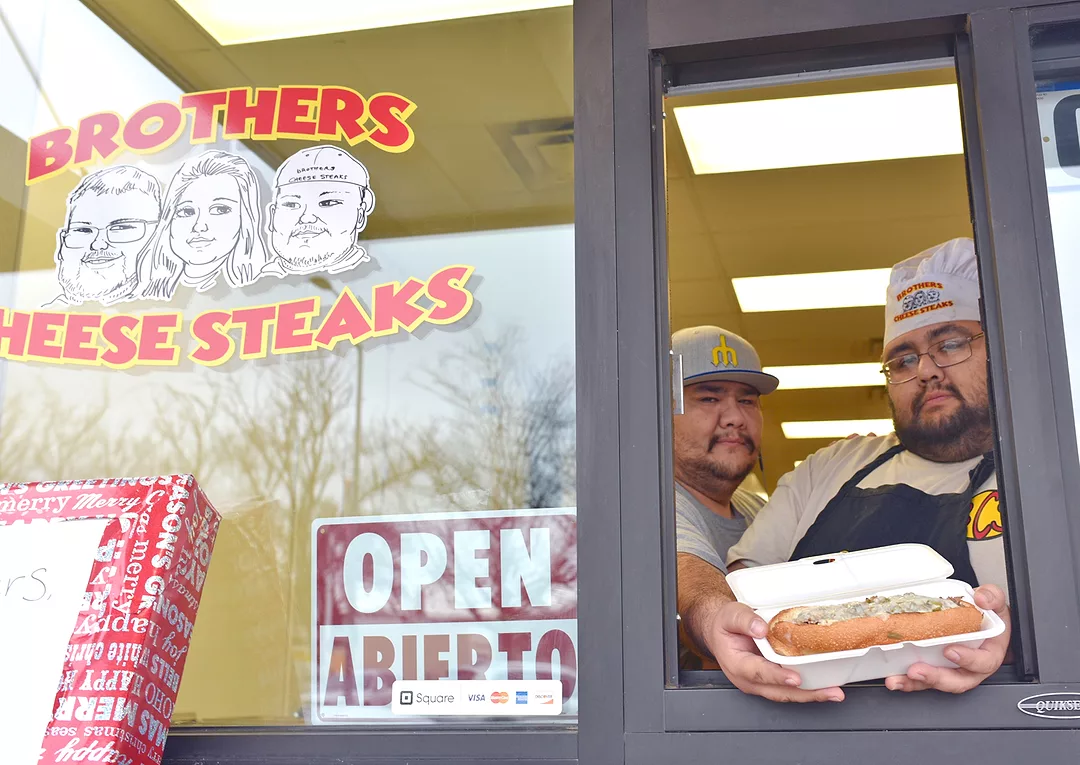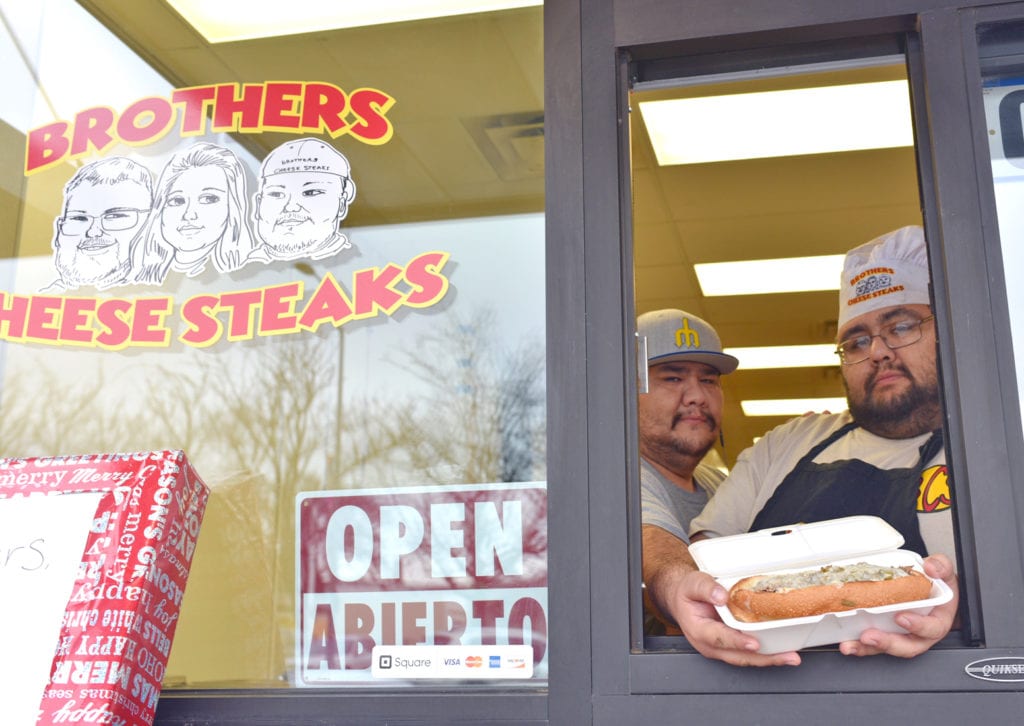
Home » Restaurateurs take baby steps toward brick-and-mortar ventures
Restaurateurs take baby steps toward brick-and-mortar ventures

December 13, 2018
Notice more food trucks opening brick-and-mortar locations? It’s a growing trend in the Tri-City food scene, accelerated in part by incubators like the Pasco Specialty Kitchen.
Once mobile food vendors like Fresh Out The Box, Hot Tamales, Foodies and Mercy’s Pizza Taco have graduated from food truck to sit-down restaurants.
And more hope to follow in their footsteps.
At the beginning of the year, Pasco Speciality Kitchen launched a walk-up window service to fledgling restaurateurs who wanted a stepping stone toward opening their own restaurant, offering a try-before-you-buy food model.
Hot Tamales was one of the first clients and one of the kitchen’s biggest success stories.
Paulina Perez started Eat Hot Tamales as a food truck in April 2017. By summer 2018, it had already opened a brick-and-mortar drive-thru location at the kitchen and boasted a staff of 11.
Hot Tamales moved into its own space at 2521 W. Kennewick Ave. in Kennewick in June.
“I always wanted to open up my own location, but I never thought I could get there as fast as we did. I thought it would be five years away or even more,” Perez said.
Brother’s Cheesesteaks and Ninja Bistro have followed her lead and now operate out of the kitchen’s walk-up windows. For these business owners, it’s an opportunity to make their goals more realistic.
“Without this opportunity they offered us, we would have to wait much longer to get our own brick and mortar, but thanks to this opportunity we’ll probably be opening one by next year,” said Mario Quintero, co-owner of Brother’s Cheesesteaks.

Before the walk-up window, Brother’s Cheesesteaks was serving Philly cheesesteaks from a pop-up tent at local farmers’ markets and events. Quintero has been operating out of the Pasco Specialty Kitchen walk-up window since and he said the reception has been positive.
“Our whole thing is really meant for saturating the market with Brother’s Cheesesteaks locations, like what Roaster’s is doing here, or Starbucks in Seattle. This is the first location that was presented to us and we took it, and we’ve been pretty successful,” he said.
He said he hopes to be at the Pasco Specialty Kitchen for about two years and then start opening other locations.
For mobile food entrepreneurs like David Phongsa of Ninja Bistro, the new location has been a learning experience. He launched his Asian fusion food truck this year to popular acclaim in Richland and decided to apply for the opportunity to serve from the kitchen.
“It’s much different from a truck. Everything here is set up like a restaurant: you prep your food in the mornings, you don’t need to haul things in and out,” Phongsa said. “But it’s also different marketing wise. You have to get people to come to you. It’s a different mindset.”
He dreams of someday opening a brick-and-mortar restaurant.
“I’ve always wanted to do more than a truck. I want to do more sauces and prepared food people can buy,” he said.
The transition from mobile truck to traditional restaurant wasn’t the trend several years ago, though.
Entrepreneurial chefs went mobile, hoping to escape the creative confines of established restaurants, said Damien Davis, operations manager for the Pasco Specialty Kitchen.
Davis has worked in the food service industry for more than 25 years, helping manage and run restaurants, so he has seen it all.
Three years ago, he moved from Portland — the mecca of the food truck scene — and has seen how the food service industry has shifted in the last couple of years.
“The cost of opening and operating brick-and-mortar businesses was so high, people were starting to leave restaurants and open food trucks. It gave chefs the artistic expression to try new things. They did it more for the food thing and less for the money. That lasted for a while and really put Portland on the map for its food truck scene,” Davis said. “Generally, your overhead is lower — that’s why it’s attractive. The cost of opening a restaurant is sometimes three to four times the cost of operating a food truck.”
But the industry started shifting as mobile food vendors began to face more regulation and taxes. “The numbers started not making as much sense,” Davis said. “It’s a misnomer that food trucks are easier. They’re harder to operate,” he said.
He said many entrepreneurs use food trucks as a way to test the success of their product in the market and grow their revenue streams, but it’s not their final destination.
“There is a tipping point. Really successful food trucks tend to open restaurants,” he said. “We’ve had clients — like Fresh Out The Box — they grew so much, they are continuing to grow revenue streams and they’re doing the food truck more because they want to, not because they have to.”
He said many only operate their food trucks for special events and catering.
Davis said incubators like the kitchen help make that transition easier and quicker for mobile food vendors, especially those with no prior experience managing a restaurant.
Perez credits the Pasco Specialty Kitchen for helping with her business’ growth and success.
She started doing delivery one day a week by pre-order and selling at Food Truck Fridays in Pasco, but her tamales quickly gained popularity.
“We quickly became booked for the summer. Everyone loved the recipe; there was a lot of community support,” Perez said.
But Perez said operating a restaurant comes with its own set of challenges.
“Operating a food truck, the overhead is really low, but when you own your own place everything is really expensive. The equipment is really expensive,” she said “It’s a big difference. When you’re in a food truck, everything is kind of planned, you have a good gauge of how much you have to make for an event and how much is going to sell.”
That’s why the kitchen wants to do its part to help.
“What’s really exciting is the growth of the food scene here and it’s still in its infancy,” said Davis. “Great food, sourced locally, made by people who have a desire — we really want to position the Pasco Specialty Kitchen to be the epicenter of that by helping the Tri-City food scene grow.”
Local News Entrepreneur Startup Ecosystems
KEYWORDS december 2018





